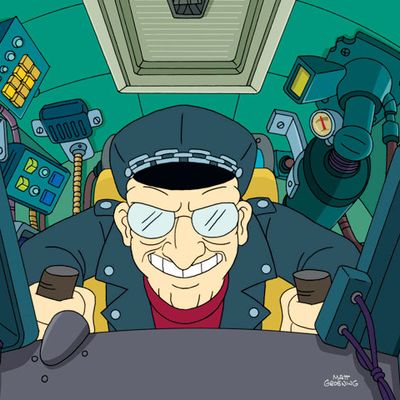
“Detecting trace amounts of mental activity, possibly a dead weasel or a cartoon viewer.” That’s a quote from Big Brain, mastermind of the Brain Spawn invasion of Earth in the animated sci-fi spoof Futurama, and it’s characteristic of the show’s self-deprecating humor. But all kidding aside, Futurama has nothing to be modest about. The series, which airs the back half of its final season starting June 19, is an undervalued gem. Its mix of rarefied genre parody and dumbass vaudeville recalls early Mel Brooks and Zucker-Abrahams-Zucker. It’s the kind of show that’ll build an episode around two seemingly disconnected plots (“Fry and Leela’s Big Fling,” the second half of the premiere night’s double feature) and merge them with a Slaughterhouse-Five joke yet stock this same episode with a solid three dozen gags that cry out for rim shots. (My favorite is an early bit, set on the primate planet Simian 7: A baboon thinks a lady in a marmoset suit is a real marmoset, tries to wow her with his opposable thumbs, and coos, “Normally, I don’t go for New World monkeys, but I am digging your upright posture.”) At its best, Futurama blends raised-eyebrow postgraduate-thesis humor and fifth-grade-lunchroom spit-take humor. That’s not a combination you see every day—and as a bonus, Futurama stirs in unironically beautiful, at times thrilling visuals: collapsing galaxies, elaborately choreographed space battles and hovercraft races, time-lapse terra-forming worlds, ravenous space beasts and formless sentient beings, robots in miniskirts. All right, fine, that last one is flat-out goofy, but it takes all kinds, right?
Set around a small delivery service called Planet Express, Futurama is populated by standard science-fiction types: the naïve fish out of water (Billy West’s twentieth-century time traveler, Fry); the badass female space warrior (Katey Sagal’s one-eyed mutant, Leela); a combination authority figure and mad scientist (Professor Farnsworth; West again); the grotesque yet lovable alien sidekick (the Borscht Belt–shticky crustacean, Dr. Zoidberg, also voiced by West; dude is everywhere!). But the series messes with these types with such abandon that they become sui generis. One can imagine many a young time traveler dreaming of spending his life gazing into Leela’s eye, but not many who would have endured so many brutal beat downs at her hands, or would have been so moved by her beauty that he’d contrive to write her name in space or sell his soul to the Robot Devil in exchange for metal hands that would let him serenade Leela on the holophonor. Sci-fi has seen no shortage of funny robot characters but none more bizarre than Bender (John DiMaggio), an alcoholic, suicidal, misanthropic pervert who has, in various episodes, become a pharaoh, a ghost, a god, a clone army, and the breakout star of the long-running soap opera All My Circuits.
Created by Matt Groening and overseen by Groening and producer David X. Cohen, Futurama’s consistent cleverness is remarkable when you consider its gypsy history. The show has meandered across media platforms with the spiraling energy of Professor Farnsworth’s Planet Express ship. It debuted in 1999 on the Fox network, got canceled four seasons later owing to low ratings, reinvented itself as a popular series of direct-to-DVD movies, landed on Comedy Central in 2006, and has stayed there ever since, airing new seasons now and again. Despite that history of production chaos, if you could chart wit on a longitudinal graph, Futurama’s would look quite robust. Unlike too many animated series, which are content to let dialogue and situations shoulder the burden of amusement (see MacFarlane, Seth, collected works of), Futurama’s humor tends to be visual and verbal at the same time. Like early Simpsons, the show Easter-eggs every scene with pop-culture riffs that you either get or you don’t.
For sci-fi fans and science geeks, groups that overlap on Futurama’s Venn diagram of fandom, a big part of the fun lies in trying to spot fleeting jokes and pop-culture references without rewatching or freeze-framing. A prime example occurs in the season-six Herman Melville parody “Möbius Dick” (an episode whose very title is a sci-fi-geek pleaser: Note the umlaut): Upon encountering a ravenous interdimensional whale beast in an outer-space version of the Bermuda Triangle, the Planet Express ship zips through a graveyard of sci-fi machines, including the shuttle from Space: 1999, the Monolith and the Discovery One from 2001: A Space Odyssey, the Satellite of Love from Mystery Science Theater 3000, and the UFO from the cover of Boston’s debut album. Despite insider gags like these, however, Futurama is more than happy to just clown around and be as silly as possible, and it has nearly as many great running gags as Groening’s other masterpiece. The best are the severed yet loquacious talking celebrity heads suspended in preservative liquid (which permits Richard Nixon to serve as Earth’s president while growling such nonsense as, “In our darkest hour, we can stand erect, with proud upthrust bosoms”) and Fry’s dumber-than-dumber-than-dumb comebacks to the simplest statements. “If you killed your grandfather, you’d cease to exist!” Farnsworth warns him in the classic season-three time-travel episode, “Roswell That Ends Well.” “But existing is basically all I do!” Fry whines.
Throughout its fourteen-year odyssey, Futurama has done a lot more than take up space on our DVRs: It has created a body of work that’ll last as long as there are geeks to obsess over it. In lieu of the poignancy it’ll no doubt indulge in its series finale, I bid Futurama adieu with all the somberness that Farnsworth displayed as he was being hauled off by death squads in season two’s “A Clone of My Own”: “Good-bye, cruel world! Good-bye, cruel lamp! Good-bye, cruel velvet drapes, lined with what appears to be some sort of cruel muslin and the curtain pom-pom tails, cruel though they may be!”
Futurama. Comedy Central. Wednesdays at 10 p.m.
*This article originally appeared in the June 24, 2013 issue of New York Magazine.


